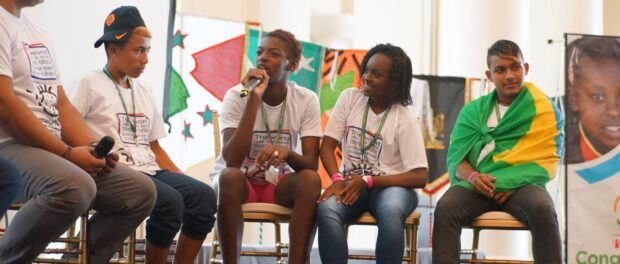
“Where are my rights?” Luana,* 17, asked at the General Assembly for Street Children. “The whole time that I’ve been out in the streets, I haven’t been able to see any respect to my rights… I’m not talking about only my own rights, but the rights of all of those who are out in the streets.”
The Assembly, which took place on Friday, March 18 at the Copacabana Palace Hotel, was part of a week-long campaign launch by international NGOs Street Child United and Terre des Hommes between March 14 and 20. The campaign, led by former street children and grassroots NGOs in nine countries, asserts the human rights of street children and advocates the need for special protection in the lead-up to mega-sporting events.
Research from Terre des Hommes’ campaign Children Win demonstrates that street children face an increased risk of human rights violations as host cities prepare to host mega-events, including forced evictions in communities such as Vila Autódromo and Favela do Metrô ahead of Rio’s Games. The report also examines Rio’s ‘street cleaning,’ or ‘social cleansing,’ operations that placed street youths like Luana in juvenile detention centers before the 2014 FIFA World Cup.
“I suffered in this institution, and when I left this institution eventually, I wanted to give back to society…” she told the audience at the General Assembly. “So, how can this happen?”
In addition to competing in Olympic-style events over the course of the week, Luana and the other former street-connected children collaborated to write an open letter to the International Olympic Committee (IOC) demanding that the rights of street children become a priority for mega-event host cities.
The open letter, which forms part of a petition, demands that IOC president Thomas Bach takes action to ensure that sports governing bodies work alongside national and local governments to “respect and assure human rights” in host cities.
The former street children also proposed the ‘Rio Resolution,’ a document asserting the human rights of children living or working on the streets. The Resolution primarily demands that street children’s rights to education, legal identity and freedom from violence are respected and enforced globally.
“Children have different needs to adults,” Andrea Florence, Terre des Hommes’ Strategic Alliance Officer, told RioOnWatch. “You see a city in a different way when you see it from a child’s perspective.
“Children are more vulnerable, and are seriously impacted by things like forced evictions,” she continued. “As well as the rights to education, legal identity and freedom from violence, children also have the right to participation.
“In the proposal for the new upgrading plan for Vila Autódromo, Eduardo Paes didn’t consult with locals, much less with the children on their opinions on urban planning. From a child’s rights perspective, he would need to talk to the kids and get their views on the proposal, in addition to (adult) locals.”

As well as ensuring marginalized youth’s rights are respected by mega-events, Jo Clark, communications manager at Street Child United, argued that the Olympic Games should be inclusive of the wider host city.
Speaking to RioOnWatch, she said, “We chose to host our athletes in the favelas of Babilônia and Chapéu Mangueira for two reasons.
“Firstly, it’s convenient as the [Street Child] Games were hosted in Urca, and secondly as a statement of solidarity for communities that are excluded from [mega-events].
“Our philosophy is about inclusivity and the Games are all about challenging negative perceptions of street children. A lot of the young people that are at risk on the streets in Rio come from or reside in favelas.
“To host the athletes in [Babilônia and Chapéu Manguiera] is a great statement about including marginalized people in the streets around the world as well as in Rio.”
The IOC has yet to publicly acknowledge the open letter and petition that resulted from the Street Child events, but an email from the IOC affirmed that both the IOC and its chosen host cities are fully committed to “protecting human rights for all Games-related matters and for all participants.” Rio’s Mayor’s office has since claimed it, too, is concerned with violations against kids. On Wednesday March 23, the National Mayors’ Front in partnership with the Rio de Janeiro city government launched the “Rio 2016 Olympics of Children’s Rights” with the aim of combating violations against children during the Summer Olympics. The project states that it will focus on the five most common areas of abuse during huge events of this kind: child sexual exploitation; child labor; use of alcohol and drugs; and lost and disappeared children.
*This name has been changed to protect the identity of the individual in question.
